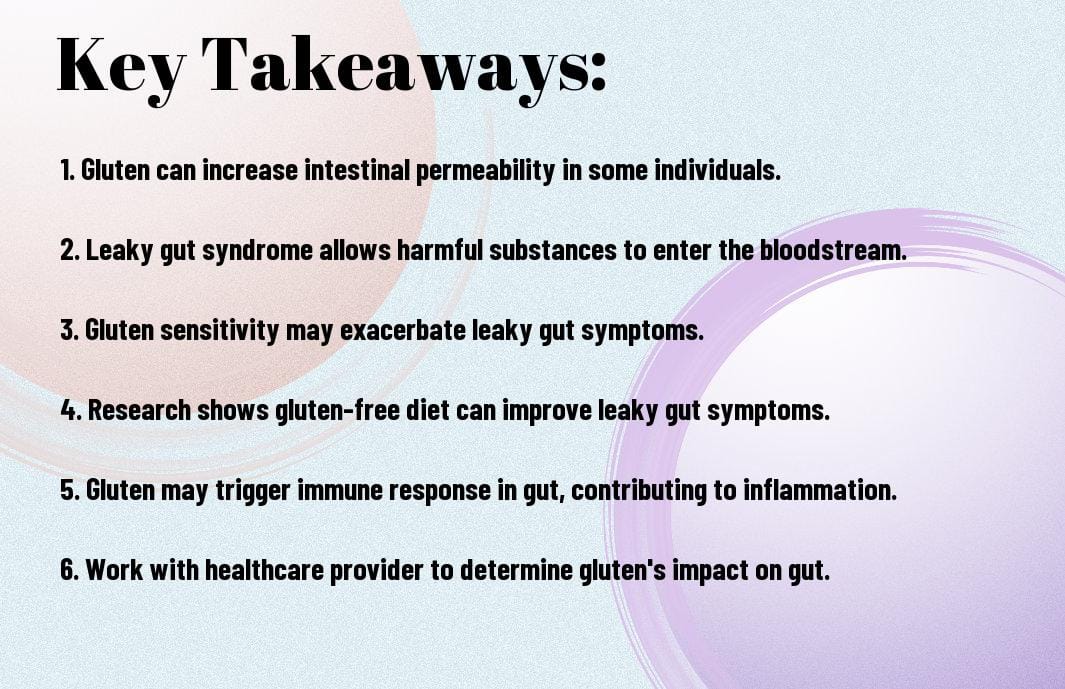Gut health is a pivotal aspect of overall well-being, and understanding the intricate relationship between gluten and leaky gut syndrome is crucial for many. The science behind the effects of gluten on the gut lining is a topic of growing interest and concern amongst health enthusiasts and professionals alike. For those seeking deeper insights into this connection, exploring the evidence-based insights provided in the article What does the science tell us about gluten and leaky gut? can shed light on the impact gluten may have on intestinal permeability and digestive health.

Barrier function refers to the lining of the intestines that acts as a protective barrier against harmful substances entering the body. The intestinal barrier is made up of a single layer of cells held together by tight junctions, which control what passes through to the bloodstream.
Health implications of a compromised intestinal barrier, commonly known as leaky gut, extend beyond the gastrointestinal system. When the integrity of the barrier is compromised, it allows harmful substances like toxins, bacteria, and undigested food particles to leak into the bloodstream, triggering an immune response and inflammation.
To further understand the impact of leaky gut on overall health, it’s crucial to recognize that this increased permeability can contribute to a range of conditions such as autoimmune diseases, food sensitivities, inflammatory bowel disease, and even mental health disorders like anxiety and depression. This highlights the intricate connection between gut health and overall well-being.
If you have ever wondered about the relationship between gluten and leaky gut syndrome, it’s crucial to understand how gluten affects the gut lining. The proteins found in gluten can trigger an immune response in the gut, leading to inflammation and damage to the intestinal barrier.
Mechanism of how gluten influences gut permeability differs between individuals. While individuals with celiac disease have a genetic predisposition leading to a severe immune reaction to gluten, those with non-celiac gluten sensitivity may experience milder symptoms but still suffer from gut permeability issues.
With celiac disease, the immune system mistakenly targets gluten as a threat, causing damage to the intestinal lining. In non-celiac gluten sensitivity, individuals may experience similar symptoms to celiac disease without the autoimmune response.
On a gluten-free diet, individuals with leaky gut syndrome may experience reduced inflammation and irritation in the gut. Avoiding gluten-containing foods can help alleviate symptoms such as bloating, diarrhea, and abdominal pain. However, challenges may arise in navigating social situations, dining out, and ensuring a well-rounded nutritional intake without relying heavily on processed gluten-free products.
For those looking to heal the gut and improve their overall health, incorporating nutrient-dense foods rich in vitamins, minerals, and antioxidants can play a key role. Additionally, lifestyle interventions such as stress management, regular physical activity, and adequate sleep can help support optimal gut function and reduce inflammation.
The key to healing the gut lies in adopting a balanced approach that combines nourishing foods with healthy lifestyle habits. By fueling the body with nutrients it needs to repair and rejuvenate the intestinal lining, individuals with leaky gut syndrome can take significant steps towards improving their gut health and overall well-being.
To wrap up, it is crucial to understand the impact of gluten on leaky gut syndrome. Gluten can contribute to gut inflammation and increased intestinal permeability, which can lead to a host of health issues. For individuals with leaky gut syndrome, eliminating gluten from their diet may help alleviate symptoms and promote healing of the gut lining. Working closely with a healthcare provider or nutritionist can aid in identifying trigger foods and implementing a suitable dietary plan. By being mindful of gluten intake and its role in leaky gut syndrome, individuals can take proactive steps towards improving their gut health and overall well-being.
This post contains affiliate links. I will earn a commission if you buy through my link.
Gut health is a pivotal aspect of overall well-being, and understanding the intricate relationship between gluten and leaky gut syndrome is crucial for many. The science behind the effects of gluten on the gut lining is a topic of growing interest and concern amongst health enthusiasts and professionals alike. For those seeking deeper insights into this connection, exploring the evidence-based insights provided in the article What does the science tell us about gluten and leaky gut? can shed light on the impact gluten may have on intestinal permeability and digestive health.

Barrier function refers to the lining of the intestines that acts as a protective barrier against harmful substances entering the body. The intestinal barrier is made up of a single layer of cells held together by tight junctions, which control what passes through to the bloodstream.
Health implications of a compromised intestinal barrier, commonly known as leaky gut, extend beyond the gastrointestinal system. When the integrity of the barrier is compromised, it allows harmful substances like toxins, bacteria, and undigested food particles to leak into the bloodstream, triggering an immune response and inflammation.
To further understand the impact of leaky gut on overall health, it’s crucial to recognize that this increased permeability can contribute to a range of conditions such as autoimmune diseases, food sensitivities, inflammatory bowel disease, and even mental health disorders like anxiety and depression. This highlights the intricate connection between gut health and overall well-being.
If you have ever wondered about the relationship between gluten and leaky gut syndrome, it’s crucial to understand how gluten affects the gut lining. The proteins found in gluten can trigger an immune response in the gut, leading to inflammation and damage to the intestinal barrier.
Mechanism of how gluten influences gut permeability differs between individuals. While individuals with celiac disease have a genetic predisposition leading to a severe immune reaction to gluten, those with non-celiac gluten sensitivity may experience milder symptoms but still suffer from gut permeability issues.
With celiac disease, the immune system mistakenly targets gluten as a threat, causing damage to the intestinal lining. In non-celiac gluten sensitivity, individuals may experience similar symptoms to celiac disease without the autoimmune response.
On a gluten-free diet, individuals with leaky gut syndrome may experience reduced inflammation and irritation in the gut. Avoiding gluten-containing foods can help alleviate symptoms such as bloating, diarrhea, and abdominal pain. However, challenges may arise in navigating social situations, dining out, and ensuring a well-rounded nutritional intake without relying heavily on processed gluten-free products.
For those looking to heal the gut and improve their overall health, incorporating nutrient-dense foods rich in vitamins, minerals, and antioxidants can play a key role. Additionally, lifestyle interventions such as stress management, regular physical activity, and adequate sleep can help support optimal gut function and reduce inflammation.
The key to healing the gut lies in adopting a balanced approach that combines nourishing foods with healthy lifestyle habits. By fueling the body with nutrients it needs to repair and rejuvenate the intestinal lining, individuals with leaky gut syndrome can take significant steps towards improving their gut health and overall well-being.
To wrap up, it is crucial to understand the impact of gluten on leaky gut syndrome. Gluten can contribute to gut inflammation and increased intestinal permeability, which can lead to a host of health issues. For individuals with leaky gut syndrome, eliminating gluten from their diet may help alleviate symptoms and promote healing of the gut lining. Working closely with a healthcare provider or nutritionist can aid in identifying trigger foods and implementing a suitable dietary plan. By being mindful of gluten intake and its role in leaky gut syndrome, individuals can take proactive steps towards improving their gut health and overall well-being.
This post contains affiliate links. I will earn a commission if you buy through my link.
